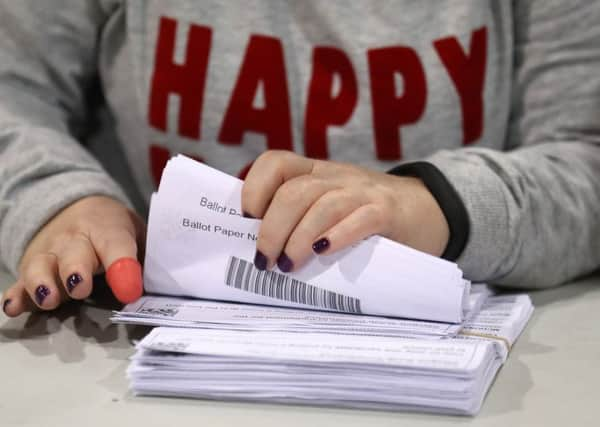General election: Why SNP and Tories are over-represented with Lib Dems short-changed – Willie Sullivan


Coming out of a General Election it’s only natural to consider how we could improve our political system. When the vote was called the faith in the political system was lower than it had been for years. It’s not hard to see why.
The sense that people do not feel “heard” is growing: an ERS poll conducted by BMG earlier this year showed that two-thirds of people (67 per cent) feel they have very few or no opportunities to inform and influence the decisions made by MPs at Westminster – and only four per cent feel they have a lot of opportunities. Research by the Hansard Society found that nearly two-thirds of people feel our system of governing needs “quite a lot” or “a great deal of improvement”.
Advertisement
Hide AdAdvertisement
Hide AdThe Brexit impasse – which led to our third general election in four years – is a clear symptom of the problem. When “working together” is treated as betrayal, and Parliament fails to reflect how people want to be represented, it’s no surprise that we are at a standstill.
Our estimates found that over 45 per cent of votes cast on Thursday’s general election didn’t count towards the local result, leaving people feeling voiceless.
With so many cut out of the picture, the centralised Westminster model of government also gives too much power to one political group – and takes too much away from local communities and citizens. But here’s the thing: it’s not inevitable. The distrust and deadlock can be countered. There are popular, vital ideas for change which we know work.
To bring politics into the 21st century, Westminster needs an ambitious, democratic overhaul. First and foremost we must reform our broken voting system.
Thursday’s election showed up our winner-takes-all voting system for the joke that it is. Millions of voters have gone totally unrepresented, with worryingly warped results in many areas and the amount of votes each party needed to win a seat varied wildly.
When the voting system leaves most voters totally unrepresented, something is clearly wrong. The majority of people did not vote for their MP in Scotland, and 1.5 million people were silenced as a result. Westminster’s voting system is warped and is not working for people here.
Whilst it took just over 25,000 votes to elect each SNP MP, the Green Party needed nearly 900,000 to elect their sole MP. When the differences are this stark, you know the system is not just struggling – it’s bankrupt.
Candidates got in on fractions of the vote, while it took Labour over 500,000 votes to elect a single MP. The Labour Party would be wise to rethink its opposition to electoral reform – not just for its own sake but for voters of all parties. Despite voters being used to using PR in Scotland, our democracy is being skewed by a warped system for sending MPs to Westminster.
Advertisement
Hide AdAdvertisement
Hide AdThe result was one that saw the Conservatives win a majority on a minority of the vote, with an increase in seat share high above their increase in vote share. The SNP have also been highly over-represented, while Liberal Democrat voters have been short changed.
Thankfully both these parties support a fair, proportional voting system.
Secondly, we must replace the House of Lords with a PR-elected second chamber representing nations and localities of the UK, spreading power far outside Westminster.
Thirdly, we need to tighten the nuts and bolts of our democracy. That means closing the loopholes in online campaigning, with proper transparency for unregulated political ads, an end to the risks of foreign funding, and an update of electoral registration – so that our right to vote is guaranteed (9.4 million people are estimated to be missing from the electoral roll). And it means parties opening up about their diversity gaps, by reporting on how representative their candidates are.
We also have to recognise that politics isn’t just what happens every five years with an X in a box. Democracy can and must be deeper than that. We want to see a constitutional convention involving citizens to work through the detail of democratic reform.
All of this can help us move towards a fairer political system that empowers all of us – and encourages a culture of co-operation, not outrage. We don’t have to accept the broken system as it is. We can build a better democracy. It’s time to be heard.
Willie Sullivan is senior director of the Electoral Reform Society Scotland